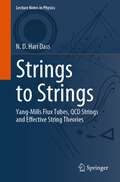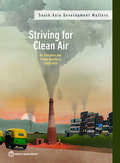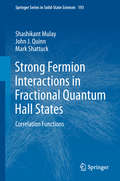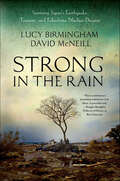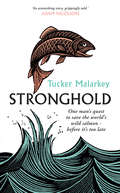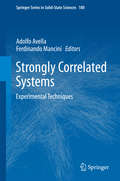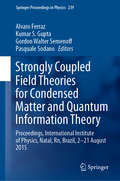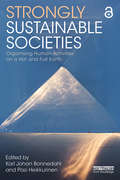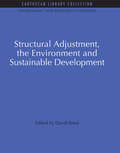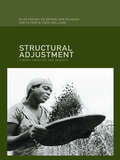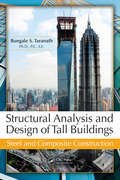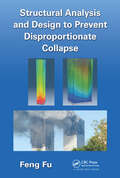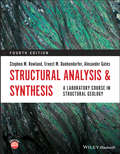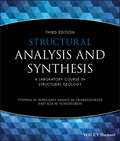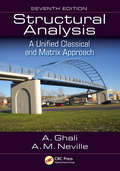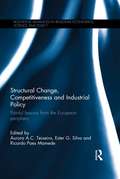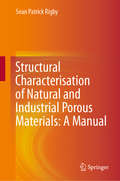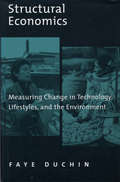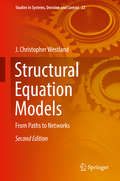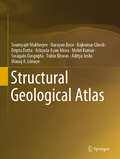- Table View
- List View
Strings to Strings: Yang-Mills Flux Tubes, QCD Strings and Effective String Theories (Lecture Notes in Physics #1018)
by N. D. Hari DassThis book presents the essentials culminating in the effective string theory of flux tubes in meticulous technical and conceptual detail. The book is divided into four parts. Part One provides historical background, while Part Two (consisting of 14 chapters) covers the passage from Heisenberg's S-matrix theory to String Theory. This includes non-perturbative LSZ formalism, dispersion relations, Regge poles, duality and dual resonance models. Part Three offers a comprehensive analysis of QCD, focusing on important concepts like asymptotic freedom and quark confinement. The section also delves into lattice gauge theories and effective descriptions of superconductivity and strong interactions. Part Four, the final two chapters, describe the lattice gauge theory determinations of Yang-Mills flux tubes in three and four dimensions and effective string theories, including their systematic constructions. These chapters provide detailed technical information to help readers, especially students, develop their expertise in these ideas. This book is ideal for graduate students, postdocs, and senior researchers looking to deepen their understanding of effective string theory and related concepts.
Striper Wars: An American Fish Story
by Dick RussellStriper Wars is Dick Russell's inspiring account of the people and events responsible for the successful preservation of one of America's favorite fish and of what has happened since.
Striving for Clean Air: Air Pollution and Public Health in South Asia (South Asia Development Matters)
by The World BankSouth Asia is home to 9 of the world's 10 cities with the worst air pollution. Concentrations of fine particulate matter (PM2.5) in some of the region's most densely populated and poor areas are up to 20 times higher than what the World Health Organization considers healthy (5 micrograms per cubic meter). This pollution causes an estimated 2 million premature deaths in the region each year and results in significant economic costs. Controlling air pollution is difficult without a better understanding of the activities that cause emissions of particulate matter. Air pollution travels long distances in South Asia and gets trapped in large 'airsheds' that are shaped by climatology and geography. 'Striving for Clean Air' identifies six major airsheds in the region and analyzes four scenarios for reducing air pollution with varying degrees of policy implementation and cooperation among countries. The analysis shows that cooperation between different jurisdictions within an airshed is crucial, and a schematic road map with three phases is proposed. The phases in the road map may overlap when the rate of progress differs, depending on local circumstances. Phase 1 would improve monitoring and institutions; Phase 2 would introduce additional and joint targets for cost-effective abatement; and Phase 3 would mainstream air quality in the economy.
Strong Fermion Interactions in Fractional Quantum Hall States: Correlation Functions (Springer Series In Solid-state Sciences Ser. #193)
by John J. Quinn Shashikant Mulay Mark ShattuckThis monograph presents an intuitive theory of trial wave functions for strongly interacting fermions in fractional quantum Hall states. The correlation functions for the proposed fermion interactions follow a novel algebraic approach that harnesses the classical theory of invariants and semi-invariants of binary forms. This approach can be viewed as a fitting and far-reaching generalization of Laughlin’s approach to trial wave functions. Aesthetically viewed, it illustrates an attractive symbiosis between the theory of invariants and the theory of correlations. Early research into numerical diagonalization computations for small numbers of electrons shows strong agreement with the constructed trial wave functions.The monograph offers researchers and students of condensed matter physics an accessible discussion of this interesting area of research.
Strong in the Rain: Surviving Japan's Earthquake, Tsunami, and Fukushima Nuclear Disaster
by David McNeill Lucy BirminghamA riveting account of Japan's triple disaster and an insightful look into what the responses of its people reveal about the national characterBlending history, science, and gripping storytelling, Strong in the Rain brings the 9.0 magnitude earthquake that struck Japan in 2011 and its immediate aftermath to life through the eyes of the men and women who experienced it. Following the narratives of six individuals, the book traces the shape of a disaster and the heroics it prompted, including that of David Chumreonlert, a Texan with Thai roots, trapped in his school's gymnasium with hundreds of students and teachers as it begins to flood, and Taro Watanabe, who thought nothing of returning to the Fukushima plant to fight the nuclear disaster, despite the effects that he knew would stay with him for the rest of his life. This is a beautifully written and moving account from Lucy Birmingham and David McNeill of how the Japanese experienced one of the worst earthquakes in history and endured its horrific consequences.
Stronghold: One man's quest to save the world's wild salmon - before it's too late
by Tucker MalarkeyStronghold is Tucker Malarkey’s enthralling account of an unlikely visionary, Guido Rahr, and his crusade to protect the world’s last bastion of wild salmon. One of the most determined creatures on earth, salmon have succeeded in returning from the sea to their birth rivers to spawn for hundreds of thousands of years – no matter what the obstacles. But our steady incursions into their habitats mean increasingly few are making it, pushing these fish to near extinction. In this improbable and inspiring story, we follow Guido on a wild and, at times, dangerous adventure from Oregon to Alaska, and then to one of the world’s last remaining wildernesses, in the Russian Far East. Along the way, Guido contends with scientists, conservationists, Russian oligarchs and corrupt officials – and befriends some unexpected allies – in an attempt to secure a stronghold for the endangered salmon, an extraordinary keystone of our ecosystem whose demise would reverberate across the planet. This book is a remarkable work of natural history, a clarion call for a sustainable future and a riveting insight into a fish whose future is closely linked to our own. p.p1 {margin: 0.0px 0.0px 0.0px 0.0px; font: 12.0px 'Adobe Garamond Pro'} p.p2 {margin: 0.0px 0.0px 0.0px 0.0px; font: 12.0px 'Adobe Garamond Pro'; min-height: 14.0px}
Strongly Correlated Systems
by Ferdinando Mancini Adolfo AvellaThis volume presents, for the very first time, an exhaustive collection of those modern numerical methods specifically tailored for the analysis of Strongly Correlated Systems. Many novel materials, with functional properties emerging from macroscopic quantum behaviors at the frontier of modern research in physics, chemistry and material science, belong to this class of systems. Any technique is presented in great detail by its own inventor or by one of the world-wide recognized main contributors. The exposition has a clear pedagogical cut and fully reports on the most relevant case study where the specific technique showed to be very successful in describing and enlightening the puzzling physics of a particular strongly correlated system. The book is intended for advanced graduate students and post-docs in the field as textbook and/or main reference, but also for other researchers in the field who appreciate consulting a single, but comprehensive, source or wishes to get acquainted, in a as painless as possible way, with the working details of a specific technique.
Strongly Coupled Field Theories for Condensed Matter and Quantum Information Theory: Proceedings, International Institute of Physics, Natal, Rn, Brazil, 2–21 August 2015 (Springer Proceedings in Physics #239)
by Alvaro Ferraz Kumar S. Gupta Gordon Walter Semenoff Pasquale SodanoThis book presents a selection of advanced lectures from leading researchers, providing recent theoretical results on strongly coupled quantum field theories. It also analyzes their use for describing new quantum states, which are physically realizable in condensed matter, cold-atomic systems, as well as artificial materials. It particularly focuses on the engineering of these states in quantum devices and novel materials useful for quantum information processing. The book offers graduate students and young researchers in the field of modern condensed matter theory an updated review of the most relevant theoretical methods used in strongly coupled field theory and string theory. It also provides the tools for understanding their relevance in describing the emergence of new quantum states in a variety of physical settings. Specifically, this proceedings book summarizes new and previously unrelated developments in modern condensed matter physics, in particular: the interface of condensed matter theory and quantum information theory; the interface of condensed matter physics and the mathematics emerging from the classification of the topological phases of matter, such as topological insulators and topological superconductors; and the simulation of condensed matter systems with cold atoms in optical lattices.
Strongly Interacting Matter in Magnetic Fields
by Karl Landsteiner Andreas Schmitt Dmitri Kharzeev Ho-Ung YeeThe physics of strongly interacting matter in an external magnetic field is presently emerging as a topic of great cross-disciplinary interest for particle, nuclear, astro- and condensed matter physicists. It is known that strong magnetic fields are created in heavy ion collisions, an insight that has made it possible to study a variety of surprising and intriguing phenomena that emerge from the interplay of quantum anomalies, the topology of non-Abelian gauge fields, and the magnetic field. In particular, the non-trivial topological configurations of the gluon field induce a non-dissipative electric current in the presence of a magnetic field. These phenomena have led to an extended formulation of relativistic hydrodynamics, called chiral magnetohydrodynamics. Hitherto unexpected applications in condensed matter physics include graphene and topological insulators. Other fields of application include astrophysics, where strong magnetic fields exist in magnetars and pulsars. Last but not least, an important new theoretical tool that will be revisited and which made much of the progress surveyed in this book possible is the holographic principle - the correspondence between quantum field theory and gravity in extra dimensions. Edited and authored by the pioneers and leading experts in this newly emerging field, this book offers a valuable resource for a broad community of physicists and graduate students.
Strongly Sustainable Societies: Organising Human Activities on a Hot and Full Earth (Routledge Studies in Sustainability)
by Karl Johan Bonnedahl Pasi HeikkurinenThe response of the international community to the pressing socio-ecological problems has been framed around the concept of ‘sustainable development’. The ecological pressure, however, has continued to rise and mainstream sustainability discourse has proven to be problematic. It contains an instrumental view of the world, a strong focus on technological solutions, and the premise that natural and human-made ‘capitals’ are substitutable. This trajectory, which is referred to as ‘weak sustainability’, reproduces inequalities, denies intrinsic values in nature, and jeopardises the wellbeing of humans as well as other beings. Based on the assumptions of strong sustainability, this edited book presents practical and theoretical alternatives to today’s unsustainable societies. It investigates and advances pathways for humanity that are ecologically realistic, ethically inclusive, and receptive to the task’s magnitude and urgency. The book challenges the traditional anthropocentric ethos and ontology, economic growth-dogma, and programmes of ecological modernisation. It discusses options with examples on different levels of analysis, from the individual to the global, addressing the economic system, key sectors of society, alternative lifestyles, and experiences of local communities. Examining key topics including human–nature relations and wealth and justice, this book will be of great interest to students and scholars of environmental and development studies, ecological economics, environmental governance and policy, sustainable business, and sustainability science.
Structural Adjustment, the Environment and Sustainable Development: Structural Adjustment, The Environment And Sustainable Development (Environmental and Resource Economics Set)
by David ReedThis is a pioneering study which should serve as a model for future research and will to a wide audience' Dharam Ghai, Director United Nations Research Institute for Social Development Structural Adjustment and the Environment (Earthscan, 1992) was the first book to fully examine the effects of 'structural adjustment programmes the economic reform policies required by the World Bank and IMF as part of their lending operations with borrowing countries. To widespread Critical acclaim it exposed the damaging environmental and social effects of structural adjustment policies, and called for a thorough revision of the then-current development policy. This new work; Structural Adjustment, the Environment and sustainable Development is a major step forward in the study of structural adjustment policies. It looks in detail at new research and analysis into their effects, and incorporates recent studies by a wide range of academics and policy-makers, leading experts and institutes. Focusing on nine in-depth case studies, the book examines the complex links between macroeconomic policies, social impacts and environmental outcomes, and takes a forward-looking perspective in outlining the alternatives to current structural adjustment policies. Review quotes for Structural Adjustment and the Environment 'Should be essential reading for all students of development' Third World Planning Review 'Breaks new ground in the debate on structural adjustment generally. and in the environment/development debate' International Affairs 'The most substantial contribution to date to what is undoubtedly an important area' Development and Change David Reed is director of the Macroeconomics for Sustainable Development Programme of WWF International, and editor of Structural Adjustment and the Environment (Earthscan, 1992). Originally published in 1996
Structural Adjustment: Theory, Practice and Impacts
by Giles Mohan Ed Brown Bob Milward Alfred B. Zack-WilliamsStructural Adjustment: Theory, Practice and Impacts examines the problems associated with Structural Adjustment Programmes (SAPs) and reveals the damaging impacts they can have. The book looks at how the debt crisis of the 1970's forced developing countries to seek external help and then reviews what constitutes as a standard adjustment programme, detailing the political, economic, social and environmental impacts of SAPs. The final section draws together theories and political responses and presents a case for alternatives to the programmes.
Structural Analysis and Design of Tall Buildings: Steel and Composite Construction
by Bungale S. TaranathAs software skills rise to the forefront of design concerns, the art of structural conceptualization is often minimized. Structural engineering, however, requires the marriage of artistic and intuitive designs with mathematical accuracy and detail. Computer analysis works to solidify and extend the creative idea or concept that might have started o
Structural Analysis and Design to Prevent Disproportionate Collapse
by Feng FuHard Guidance on Preventing Disproportionate CollapseDisproportionate collapse is a pressing issue in current design practice. Numerous causes are possible - especially forms of extreme loading, such as blast, fire, earthquake, or vehicle collisions. But it is the mechanism and its prevention which are of especial interest and concern.After the Wor
Structural Analysis and Synthesis: A Laboratory Course in Structural Geology
by Ernest M. Duebendorfer Stephen M. Rowland Alexander GatesStructural Analysis and Synthesis is the best-selling laboratory manual of its kind. Specifically designed to support the laboratory work of undergraduates in structural geology courses, the book helps students analyze the various aspects of geological structures, and to combine their analyses into an overarching synthesis. This book is intended for use in the laboratory portion of a first course in structural geology. As is explicit in the title, this book is concerned with both the analysis and synthesis of structural features. In this 4th edition, the focus of this popular manual has been broadened to include a range of new content and features, including: Video content which demonstrates visually how to perform some of the more challenging structural geology techniques An acknowledgement of the increasing importance of environmental applications of structural geology – vital to students who may go on to pursue careers in the environmental sphere An increased emphasis on quantitative techniques, complete with descriptions of computer program applications Contingent with this quantitative emphasis, the book also outlines the limitations of such techniques, helping students to appropriately apply the techniques and evaluate their trustworthiness Structural Analysis and Synthesis, 4th edition is a renowned and widely recognized aid to students in grasping and mastering the techniques required in structural geology, and will find a home wherever the principles and practices of structural geology are taught.
Structural Analysis and Synthesis: A Laboratory Course in Structural Geology
by Ilsa M. Schiefelbein Ernest M. Duebendorfer Stephen M. RowlandThis widely used, highly readable introduction to structural analysis is specifically designed to support the laboratory work of undergraduates in structural geology courses. The new third edition includes: New and amended exercises and redrafted figures to improve clarity A single fold-out map of the Bree Creek Quadrangle – a mythical site used to help students analyze various aspects of the geologic structures exposed within this quadrangle and ultimately to develop a grand synthesis A user-friendly spiral binding ideal for work in the lab or out in the field An Instructor manual CD-ROM for this title is available. Please contact our Higher Education team at HigherEducation@wiley.com for more information.
Structural Analysis: A Unified Classical and Matrix Approach (Seventh Edition)
by Amin Ghali Adam NevilleThis comprehensive textbook combines classical and matrix-based methods of structural analysis and develops them concurrently. It is widely used by civil and structural engineering lecturers and students because of its clear and thorough style and content. The text is used for undergraduate and graduate courses and serves as reference in structural engineering practice. With its six translations, the book is used internationally, independent of codes of practice and regardless of the adopted system of units.
Structural Change, Competitiveness and Industrial Policy: Painful Lessons from the European Periphery (Routledge Advances in Regional Economics, Science and Policy)
by Aurora A.C. Teixeira Ester Silva Ricardo Paes MamedeThe onset of the global crisis has emphasised the persistence of substantial differences in development and social progress within the euro area. The specific case of countries located in the southern periphery region has come to the centre stage, due to the harsh economic conditions that all these countries have experienced in the recent past. In the aftermath of the American subprime credit bubble, these countries’ high indebtedness raised doubts as to their ability to sustain public finances, with the financial crisis developing and gaining momentum due to the fragilities presented in the economy. To varying degrees of severity, all of these economies have since been forced to introduce strong fiscal tightening programmes in order to achieve fiscal consolidation, which have translated into recession and rising unemployment. This book undertakes a comprehensive analysis of the causes of the crisis in southern European countries, showing that the ‘Achilles heel’ of these economies is rooted in the dismal evolution of productivity and in a specialisation pattern excessively based on the so-called ‘traditional’, low, and low-medium tech industries, which yield low margins, declining export shares and, ultimately, withering international competitiveness. Such evidence suggests that the southern European periphery industrial growth model has reached its limits, demanding a multidimensional policy approach capable of overcoming the magnitude and complexity of the present crisis. Without denying the need to adjust public and private balance sheets, it is argued that finding a sustainable path out of the present problems requires addressing the challenges of productivity growth and competitiveness in the long term.
Structural Characterisation of Natural and Industrial Porous Materials: A Manual
by Sean Patrick RigbyThis book focuses on structural characterisation techniques for porous materials. Covering a range of techniques, including gas sorption, mercury porosimetry, thermoporometry, NMR and imaging methods, this practical guide presents the basic theory behind each characterisation technique, and discusses the practicalities of the experimental and data analysis approaches needed for complex industrial samples. The book shows readers how to approach characterising a particular sort of material for the first time and then how to develop a strategy for more in-depth analysis. It also demonstrates how to determine the best techniques for solving particular problems, and describes methods of obtaining the required information, as well as the limitations of various methods. It particularly highlights a scientific approach involving parameter validation and simple acquisition. Featuring examples taken from case studies of real-world industrial materials, this book is intended for industrial practitioners and researchers. It provides a manual of potential techniques and answers questions concerning porous materials that arise in areas such as the catalyst industry, the oil and gas sector, batteries, fuel cells, tissue engineering scaffolds and drug delivery devices.
Structural Dynamics in Earthquake and Blast Resistant Design
by BK Raghu PrasadFocusing on the fundamentals of structural dynamics required for earthquake blast resistant design, Structural Dynamics in Earthquake and Blast Resistant Design initiates a new approach of blending a little theory with a little practical design in order to bridge this unfriendly gap, thus making the book more structural engineer-friendly. This is attempted by introducing the equations of motion followed by free and forced vibrations of SDF and MDF systems, D’Alembert’s principle, Duhammel’s integral, relevant impulse, pulse and sinusoidal inputs, and, most importantly, support motion and triangular pulse input required in earthquake and blast resistant designs, respectively. Responses of multistorey buildings subjected to earthquake ground motion by a well-known mode superposition technique are explained. Examples of real-size structures as they are being designed and constructed using the popular ETABS and STAAD are shown. Problems encountered in such designs while following the relevant codes of practice like IS 1893 2016 due to architectural constraints are highlighted. A very difficult constraint is in avoiding torsional modes in fundamental and first three modes, the inability to get enough mass participation, and several others. In blast resistant design the constraint is to model the blast effects on basement storeys (below ground level). The problem is in obtaining the attenuation due to the soil. Examples of inelastic hysteretic systems where top soft storey plays an important role in expending the input energy, provided it is not below a stiffer storey (as also required by IS 1893 2016), and inelastic torsional response of structures asymmetric in plan are illustrated in great detail. In both cases the concept of ductility is explained in detail. Results of response spectrum analyses of tall buildings asymmetric in plan constructed in Bengaluru using ETABS are mentioned. Application of capacity spectrum is explained and illustrated using ETABS for a tall building. Research output of retrofitting techniques is mentioned. Response spectrum analysis using PYTHON is illustrated with the hope that it could be a less expensive approach as it is an open source code. A new approach of creating a fictitious (imaginary) boundary to obtain blast loads on below-ground structures devised by the author is presented with an example. Aimed at senior undergraduates and graduates in civil engineering, earthquake engineering and structural engineering, this book: Explains in a simple manner the fundamentals of structural dynamics pertaining to earthquake and blast resistant designIllustrates seismic resistant designs such as ductile design philosophy and limit state design with the use of capacity spectrumDiscusses frequency domain analysis and Laplace transform approach in detailExplains solutions of building frames using software like ETABS and STAADCovers numerical simulation using a well-known open source tool PYTHON
Structural Dynamics with Applications in Earthquake and Wind Engineering
by Konstantin Meskouris Christoph Butenweg Klaus-G. Hinzen Rüdiger HöfferThis book offers a comprehensive introduction to the theory of structural dynamics, highlighting practical issues and illustrating applications with a large number of worked out examples. In the spirit of “learning by doing” it encourages readers to apply immediately these methods by means of the software provided, allowing them to become familiar with the broad field of structural dynamics in the process.The book is primarily focused on practical applications. Earthquake resistant design is presented in a holistic manner, discussing both the underlying geophysical concepts and the latest engineering design methods and illustrated by fully worked out examples based on the newest structural codes. The spectral characteristics of turbulent wind processes and the main analysis methods in the field of structural oscillations due to wind gusts and vortex shedding are also discussed and applications illustrated by realistic examples of slender chimney structures. The user‐friendly software employed is downloadable and can be readily used by readers to tackle their own problems.
Structural Economics: Measuring Change in Technology, Lifestyles, and the Environment
by Faye DuchinIn all societies, the main causes of environmental degradation are resource extraction and the generation of waste by households and industries. Realistic strategies for mitigating these impacts require an understanding of both the technologies by which resources are transformed into products, and the lifestyle choices that shape household use of such products.Structural Economics provides a framework for developing and evaluating such strategies. It represents an important new approach to describing household lifestyles and technological choices, the relationships between them, and their impact on resource use and waste. In this volume, economist Faye Duchin provides for the first time an authoritative and comprehensive introduction to the field, including its social and technological dimensions.Duchin's primary achievement is integrating a qualitatively rich understanding of technologies and lifestyles into a flexible, quantitative framework grounded in established principles of input-output economics and social accounting. She uses tools and insights from areas as diverse as demography and market research to conceptualize and describe different categories of households and their lifestyles. She also draws on the expertise of engineers and physical scientists to examine the potential for technological change. The framework Duchin develops permits the rigorous and detailed analysis of specific scenarios for alternative technologies and changes in lifestyle.The new field of structural economics represents an important step forward in the effort to apply the power of science to solving the problems of modern societies. This book should prove invaluable to students and scholars of economics, sociology, or anthropology, as well as environmental scientists, policymakers at all levels, and anyone concerned with a practical interpretation of the elusive concept of sustainable development.
Structural Equation Models: From Paths to Networks (Studies in Systems, Decision and Control #22)
by J. Christopher WestlandThis new edition surveys the full range of available structural equation modeling (SEM) methodologies. The book has been updated throughout to reflect the arrival of new software packages, which have made analysis much easier than in the past. Applications in a broad range of disciplines are discussed, particularly in the social sciences where many key concepts are not directly observable. This book presents SEM’s development in its proper historical context–essential to understanding the application, strengths and weaknesses of each particular method. This book also surveys the emerging path and network approaches that complement and enhance SEM, and that are growing in importance. SEM’s ability to accommodate unobservable theory constructs through latent variables is of significant importance to social scientists. Latent variable theory and application are comprehensively explained and methods are presented for extending their power, including guidelines for data preparation, sample size calculation and the special treatment of Likert scale data. Tables of software, methodologies and fit statistics provide a concise reference for any research program, helping assure that its conclusions are defensible and publishable.
Structural Geological Atlas
by Soumyajit Mukherjee Aditya Joshi Achyuta Ayan Misra Narayan Bose Rajkumar Ghosh Dripta Dutta Mohit Kumar Swagato Dasgupta Tuhin Biswas Manoj A. LimayeThis book presents more than 600 eye-catching structural geological photographs and explanatory descriptions, from different Indian terrains. This book will enable easy identification of deformation features, one of the most important tasks in structural geology at the meso- and micro-scales. The book focuses on ductile and brittle shear sense indicators. This book suits for the undergraduate and graduate geoscience students. The book will be of considerable interest to tectonicians and structural geologists, given the enormous international importance of Indian terrains for exploration and other purposes.
Structural Geology
by Donal M. RaganThis combination of text and lab book presents an entirely different approach to structural geology. Designed for undergraduate laboratory classes, it provides a step-by-step guide for solving geometric problems arising from structural field observations. The book discusses both traditional methods and cutting-edge approaches, with emphasis given to graphical methods and visualization techniques that support students in tackling challenging two- and three-dimensional problems. Numerous exercises encourage practice in using the techniques, and demonstrate how field observations can be converted into useful information about geological structures and the processes responsible for creating them. This updated fourth edition incorporates new material on stress, deformation, strain and flow, and the underlying mathematics of the subject. With stereonet plots and solutions to the exercises available online at www. cambridge. org/ragan, this book is a key resource for undergraduates, advanced students and researchers wanting to improve their practical skills in structural geology.
